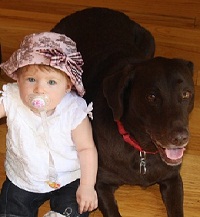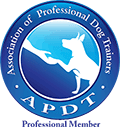Archive CF :: Preparing Fido for your New Baby

|
Your dog has been a loving and loyal family member. But now you have a new baby on the way, a little being who will in many ways consume the attention and energy that has until now been channeled toward your pup. Patient, positive preparation will help the relationship between your dog and your new baby start out on the right foot. Here are some ways you can prepare your canine companion for the changes that lie ahead... |
Preparation for Baby
- Have a vet wellness check-up to make sure your dog is healthy and in no pain. A dog who's painful or not feeling well may have a shorter temper. Also spaying/neutering your dog reduces certain health risks and may also make your dog generally calmer.
- Gradually prepare your dog for spending less time with you.
- Consider re-introducing the crate to your dog if possible. This can give him a safe, private place to retire to should he need some time away from the baby. It also gives you a safe place to confine him should you need to.
- If you have been the dog's most bonded person up until now, start strengthening your dog's relationships with other family members (i.e. your husband).
- Now is the time to work on any behavior issues that your dog might have -- jumping, nipping, barking, destructive behavior, resource guarding, fear aggression, leash reactivity, etc.
- Train your dog to lie quietly beside you while you sit on the floor (where you will soon be cradling a newborn).
- Make the baby's room off-limits to the dog well in advance of the birth by keeping the door closed. You can have a dog bed just inside the door of the room if you'd like; this will be the place where your dog is expected to remain if and when he is invited into the baby's room by an adult.
- Use a baby doll to acclimate your dog to baby activities, like baths and diaper changes, and to your attentions directed elsewhere.
- Accustom your dog to baby-related sounds, including baby sounds, the mechanical infant swing, the rocking chair, etc.
- Apply baby powder and baby oil on your skin so your dog becomes familiar with these scents.
- Invite visitors to your home who have babies so that you can acquaint your dog with baby sounds and antics in small doses. All interactions should be supervised.
- Have a dog sitter set up well in advance for when you go into labor.
Bringing Baby Home
- Bring home a blanket or something that has the baby's scent on it for your dog to become familiar with.
- Have someone go to the home in advance of your arrival with the baby to take your dog out for a nice long walk or some play to take the edge off of his energy. Don't bring the dog back inside until you and baby have settled in at home.
- Have someone else attending to the baby in another room so that your dog has a chance to greet you after your absence. Be warm, loving and calm in your reunion.
- Then bring your dog into the baby's room on leash to sit at a distance from one parent and the baby while the other parent rewards him with tasty treats for calm, polite, appropriate behavior around the baby. Ask him for sits and downs as a way of instructing him about the behavior you're expecting from him around the baby.
- If your dog approaches too exuberantly, suppress the urge to scold or correct him with the leash. You want to associate the baby with positive things, not negative. Instead, use treats to guide him away from the baby, ask him for some quiet behaviors (sit or down), wait for him to calm a bit, then try another approach.
- Never force your dog to get closer to the baby than he's comfortable. And most importantly, supervise every interaction. The first several interactions should be done with your dog on leash and with some distance, since sudden movements or noises from the baby may startle your dog at first. Try to distract him if he starts to bark at the baby and remove him from the room if he persists. Above all, never leave your dog alone with your baby.
- Gradually, over a period of several interactions, let your dog get closer until finally he can sniff the baby in your lap, but do not allow him to nudge or paw at him/her.
- Keep as much of your dog's normal routine as possible (meals, exercise, play, etc). Too much change in routine can cause stress, beyond the stresses of having a new wailing family member. Make sure to spend one-on-one quality time (playing, exercising, training, grooming) with your dog so he doesn't feel neglected. Carry treats around with you during these early days so that you can richly reward your dog for good behavior. This is a crucial time when he is forming positive associations about and habits in behavior around your baby.
Using calm, positive training and leadership with your dog will help forge a loving bond between him and your new baby. Just plan ahead so that your pup can learn to navigate his new world in baby steps.




